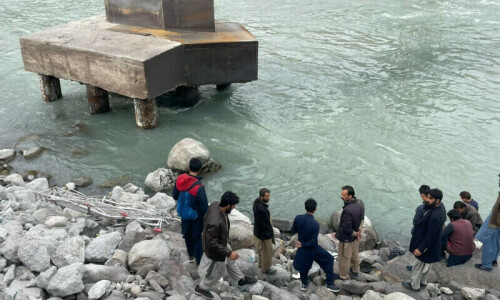MOGADISHU, Jan 13: Ethiopian troops supporting Somalia’s western-backed government quit four of their main bases in Mogadishu on Tuesday, heralding an uncertain new chapter for the anarchic Horn of Africa nation.
Many residents were overjoyed by the departure of soldiers they saw as occupiers, even though some analysts fear it will leave a power vacuum and trigger more violence by Islamist rebels who have been battling the government and each other.
“We were chanting ‘Praise be to Allah’, who made the troops leave our area,” local man Hussein Awale said as hundreds of people gathered at one of four military facilities in the north of the city that were abandoned by the soldiers.
Insurgents have been fighting the interim government and Ethiopian forces for two years, since Addis Ababa sent soldiers to help drive a sharia courts group out of Mogadishu.
More than 16,000 civilians have been killed and one million have been forced from their homes. But frustrated by rifts in the Somali administration, and the cost of the operation, Ethiopia has decided to withdraw its estimated 3,000 troops.
At a farewell ceremony in the presidential palace, Somali Prime Minister Nur Hassan Hussein confirmed the pullout was under way and said Ethiopian officers were going to the airport.
“We are very thankful to Ethiopia for sacrificing its lives and its economy for the safety of Somali government,” he said.
Ethiopian commander Colonel Gabre Yohanes said the forces had been crucial in pushing forward a fledgling peace process.
“Ethiopia had no intention other than helping the Somali government and now we are pulling out our forces,” he said. “We have sacrificed our lives and helped maintain the existence of the Somali government as well as building its national forces.”
Rights groups, however, accuse the Ethiopians of abuses including rape and extrajudicial executions of civilians.
MORE BLOODSHED: The Ethiopians have another 10 bases around Mogadishu. It was not immediately clear when they would be vacated.
But an Islamist opposition spokesman said he was told all Ethiopian soldiers would leave the city on Tuesday. The coastal capital is a 500-km journey from the Ethiopian border.
“Ethiopian troops have left their strategic main bases in Mogadishu and the others will withdraw today,” said Suleiman Olad Roble of the Alliance for the Re-Liberation of Somalia.
The country, which Washington has long feared may become a militants’ haven, has been mired in civil conflict for 18 years.
Some analysts believe the exit of Ethiopian troops could be positive, prompting the more moderate Islamist groups to join a process of forming a more broad, inclusive government.
But there are few signs of a quick end to the bloodshed.
At least 11 civilians were killed by shells in Mogadishu on Monday when insurgents battled government forces and their Ethiopian allies.
There has also been fierce fighting between rival Islamist factions in the central trading town of Gurael.
More than 50 people were killed there in battles at the weekend between gunmen from the hardline al Shabaab group and another Islamist group, Ahlu Sunna Waljamaca, witnesses said.
Aid workers said between 45,000 and 60,000 civilians had fled Gurael and the regional capital Dusamareb in recent days.
“Gurael has become a ghost town, as has Dusamareb,” said Tom Quinn, Medecins Sans Frontieres coordinator for Somalia.
Some Islamist factions appear to be turning on al Shabaab, which wants to impose a strict version of sharia shunned by traditionally moderate Somalis. The United States has formally listed it as a terrorist organisation with links to al Qaeda.
The African Union (AU) has been desperately trying to strengthen a small peacekeeping mission of 3,500 troops from Uganda and Burundi. But despite pledges of extra battalions from those two nations and Nigeria, they have yet to deploy.
“The ball is now in the court of the Somalis, particularly those who said they were only fighting against the Ethiopian forces, to stop the senseless killings and violence,” said UN envoy Ahmedou Ould-Abdallah.—Reuters











































Dear visitor, the comments section is undergoing an overhaul and will return soon.